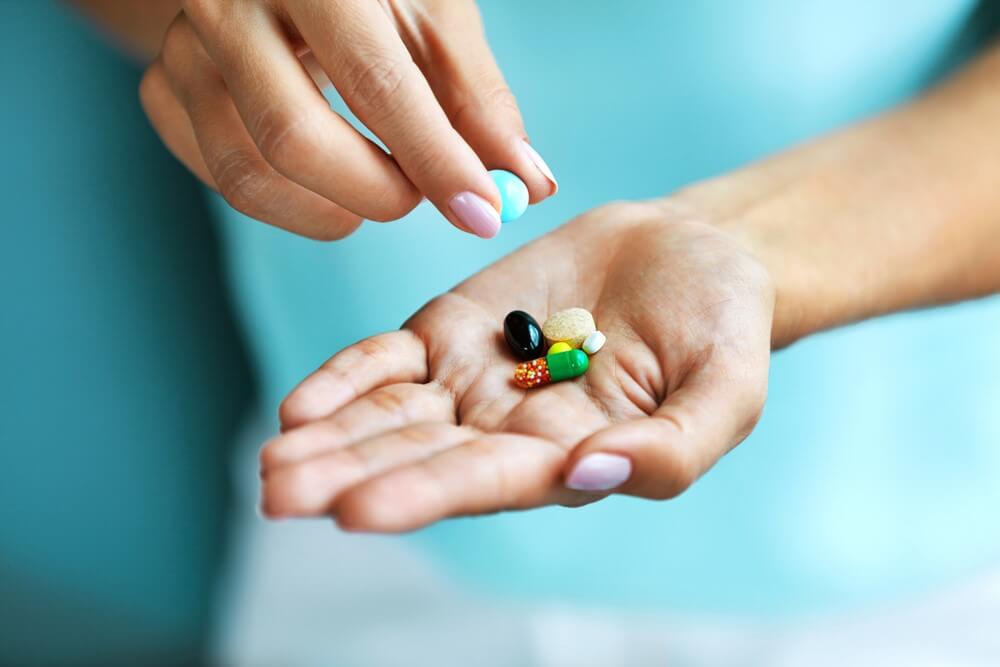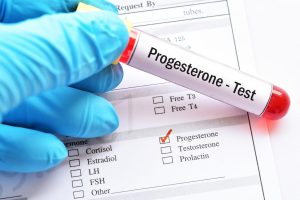Alternatives to Progesterone Supplements for Managing PCOS

- PCOS symptoms are often treated by doctors with the progesterone pill.
- The progesterone pill may not always help manage PCOS.
- Alternative medications include Inositol, Omega3, NAC, Magnesium and Zinc.
- Use the Nabta tracking app to monitor your periods, ovulation cycle and managing PCOS.
Our understanding of PCOS is expanding; we now know that it is a syndrome, encompassing a range of symptoms, each experienced to a varying extent by individual patients. PCOS symptoms are often treated by doctors with the progesterone pill. We understand that to manage it successfully, a fully personalised approach should be taken on a patient by patient basis. We also know that one of the defining features of the condition is anovulation, a failure to ovulate, and with this comes irregular menstrual cycles and infertility.
The preferred option for rectifying this is to increase the body’s own, endogenously produced, progesterone. Identifying the cause of the PCOS and making the relevant lifestyle and dietary changes can be sufficient to restore fertility, without needing to take additional steps. However, sometimes additional supplements can provide an extra boost.
Why the progesterone pill is not always the answer for managing PCOS
When managing PCOS, the main thing is to carefully consider what you are putting into your body. Many doctors will prescribe medication that will either be ineffective, or only provide short-term relief. The combined oral contraceptive pill is one example; due to the fact that some versions of the pill increase insulin resistance, treatment with this is likely to exacerbate the symptoms experienced by women with insulin resistant PCOS, which is thought to be present in up to 70% of those with the condition. For those who do find that the pill relieves some of their symptoms, usually as a result of its anti-androgenic properties, the effects will only last for as long as the pill is taken for. Another concerning fact is that some women experience PCOS-like symptoms when they stop taking the pill. It can take months, or even years, for their menstrual cycles to become regular again.
Alternatives to the pill
Bioidentical progesterone supplementation is one option for improving the symptoms of PCOS; however, there are other options, which may also be worth considering:
- Inositol. Regulates insulin levels and improves the metabolic symptoms of PCOS. Ovarian function improves following treatment with inositol and testosterone levels reduce.
- Omega-3. Improves insulin resistance and reduces cardiovascular risk factors.
- Vitex (chaste tree berry). Promotes ovulation by inhibiting prolactin. Reduces the effects of excess androgens, for example, hirsutism. Improves menstrual cyclicity.
- N-Acetyl-Cysteine (NAC). An antioxidant with similar pharmacological activity to the anti-diabetic drug metformin. Improves live birth rates and ovulation compared to a placebo.
- Magnesium. Often taken in combination with vitamin E. Reduces insulin levels and has anti-inflammatory activity.
- Zinc. Reduces insulin levels and improves the metabolic profile of patients with PCOS.
Always speak to a professional before undertaking treatment or starting supplements. Not every supplement will work for every patient when managing PCOS; for example vitex is not recommended for those who have high levels of circulating luteinising hormone, as it can raise levels further. In addition, no single supplement will resolve every PCOS symptom, so ensure that the one you take is appropriate for your requirements and that there is research-based evidence that it is effective at managing the symptoms that you have.
Nabta is reshaping women’s healthcare. We support women with their personal health journeys, from everyday wellbeing to the uniquely female experiences of fertility, pregnancy, and menopause.
Get in touch if you have any questions about this article or any aspect of women’s health. We’re here for you.
Sources:
- Arentz, S, et al. “Herbal Medicine for the Management of Polycystic Ovary Syndrome (PCOS) and Associated Oligo/Amenorrhoea and Hyperandrogenism; a Review of the Laboratory Evidence for Effects with Corroborative Clinical Findings.” BMC Complementary & Alternative Medicine, vol. 14, 18 Dec. 2014, p. 511., doi:10.1186/1472-6882-14-511.
- Costantino, D, et al. “Metabolic and Hormonal Effects of Myo-Inositol in Women with Polycystic Ovary Syndrome: a Double-Blind Trial.” European Review for Medical and Pharmacological Sciences, vol. 13, no. 2, 2009, pp. 105–110.
- Foroozanfard , F, et al. “Effects of Zinc Supplementation on Markers of Insulin Resistance and Lipid Profiles in Women with Polycystic Ovary Syndrome: a Randomized, Double-Blind, Placebo-Controlled Trial.” Experimental and Clinical Endocrinology & Diabetes, vol. 123, no. 4, Apr. 2015, pp. 215–220., doi:10.1055/s-0035-1548790.
- Gerli, S, et al. “Randomized, Double Blind Placebo-Controlled Trial: Effects of Myo-Inositol on Ovarian Function and Metabolic Factors in Women with PCOS.” European Review for Medical and Pharmacological Sciences, vol. 11, no. 5, 2007, pp. 347–354.
- Shokrpou, M, and Z Asemi. “The Effects of Magnesium and Vitamin E Co-Supplementation on Hormonal Status and Biomarkers of Inflammation and Oxidative Stress in Women with Polycystic Ovary Syndrome.” Biological Trace Element Research, 18 Dec. 2018, doi 10.1007/s12011-018-1602-9.
- Thakker, D, et al. “N-Acetylcysteine for Polycystic Ovary Syndrome: A Systematic Review and Meta-Analysis of Randomized Controlled Clinical Trials.” Obstetrics and Gynecology International, vol. 817849, 2015, doi:10.1155/2015/817849.
- Yang, K, et al. “Effectiveness of Omega-3 Fatty Acid for Polycystic Ovary Syndrome: a Systematic Review and Meta-Analysis.” Reproductive Biology and Endocrinology, vol. 16, no. 1, 27 Mar. 2018, p. 27., doi:10.1186/s12958-018-0346










